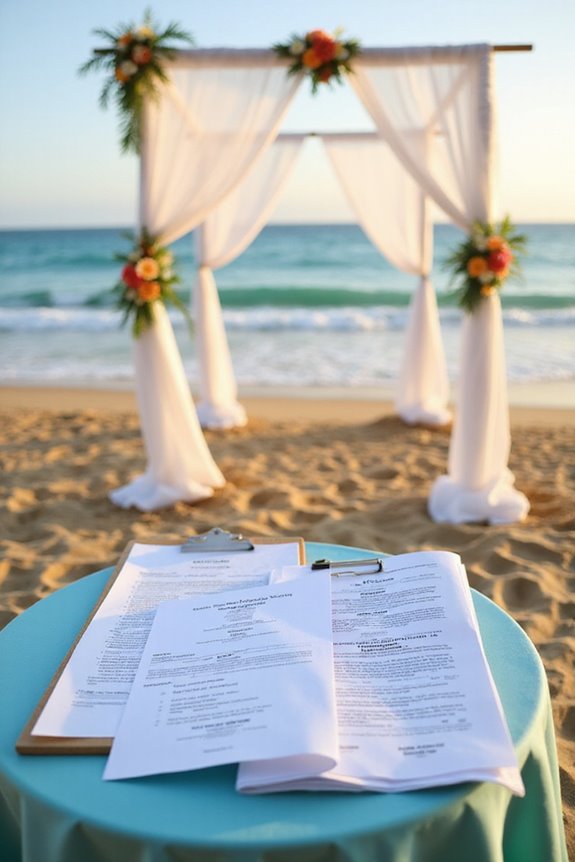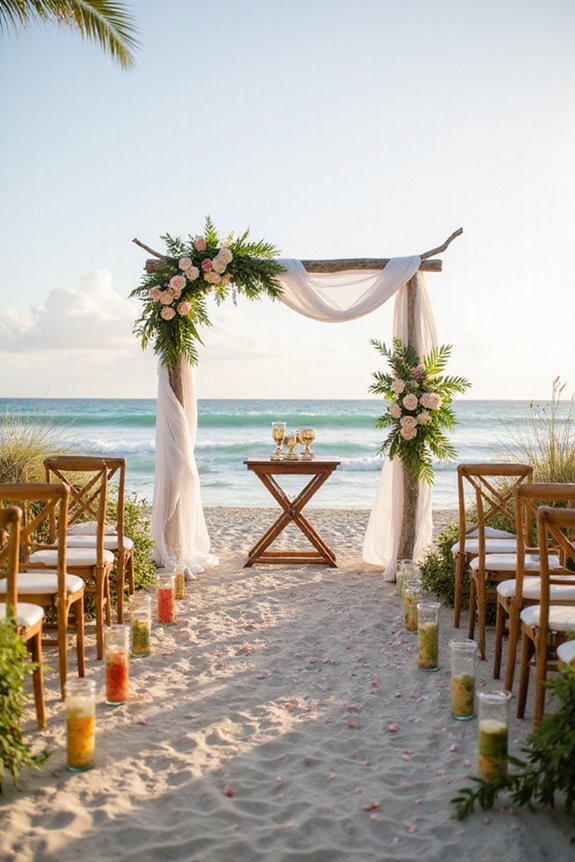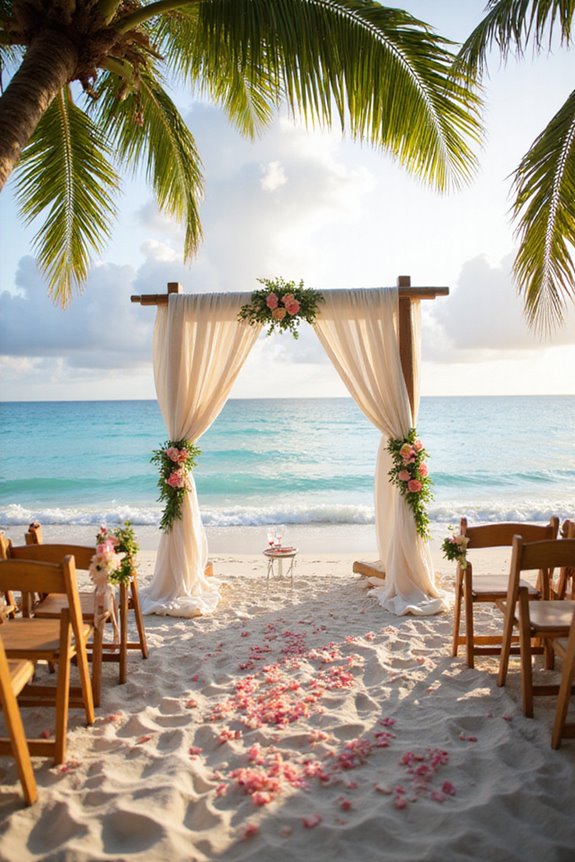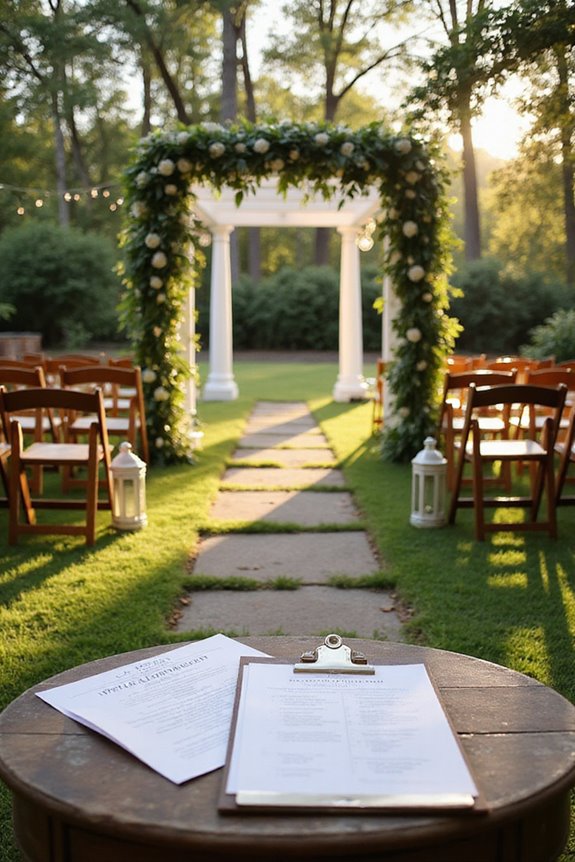Planning a beach wedding can be a blast if we keep a few key points in mind! First, let’s pick the right venue. We’ll want to contemplate access, aesthetics, and how many guests we can fit. Don’t forget to check permit requirements early—no one wants fines on their big day! As for attire, lightweight fabrics are a must, and maybe some fun sunglasses for guests. Curious about ceremony logistics and weather plans? Let’s keep going!
Key Takeaways
- Choose a beach venue that is accessible and aligns with your wedding theme, ensuring it has enough space for guests and dancing.
- Obtain necessary permits for the beach location well in advance to avoid fines and ensure a smooth wedding day.
- Plan a timeline that includes budgeting, guest list preparation, and vendor confirmations, starting 12 months before the wedding.
- Select comfortable attire suitable for beach weather, incorporating lightweight fabrics and accessories for sun protection.
- Arrange ceremony logistics, such as marking off the area for privacy and providing amenities like towels for guests to manage sand.
Choosing the Right Beach Venue
When it comes to planning our dream beach wedding, choosing the right venue can feel like an overwhelming task. We want that perfect beach vibe! First, let’s consider accessibility. A beachfront spot makes for great memories, but we should check parking and nearby accommodations. Next, think about venue aesthetics; we want a backdrop that suits our theme, whether that’s tropical or rustic. How about visiting a few places in person? It’s way better than relying on photos! Don’t forget to check guest capacity and layout; we need space for everyone to dance! Finally, weather is a biggie. Let’s choose a time of day that maximizes those stunning sunset views but also consider backup plans for unexpected rain. Happy planning!
Understanding Permits and Legalities

Before diving into the fun details of your beach wedding, let’s chat about something that might seem a bit less exciting but is super important: permits and legalities. We need to submit a permit application for our chosen beach, even if it’s just a small gathering. Applications should be sent in 90 days to 3 weeks before the big day. We’ll also want to look into liability insurance, which is often required, especially if we’re hiring vendors. Don’t forget to check local rules, as some beaches have specific regulations regarding setups and alcohol. Remember, no permit means potential fines, so let’s keep our wedding stress-free by handling this essential step early!
Creating a Planning Timeline

As we plunge into planning our beach wedding, it’s vital to create a solid timeline to keep everything on track. First, let’s tackle our budget considerations. We should set a budget 12 to 8 months out, factoring in our desired location and guest count.
Next, we can draft a preliminary guest list to estimate accommodations needed for everyone. Sending out save-the-date cards about 6 months in advance is essential, especially for destination weddings.
As we get closer, we’ll confirm our vendors and finalize guest arrangements about 2 months before. Finally, in the last month, we’ll focus on last-minute details and make sure everyone knows their roles. A well-planned timeline helps avoid beach-day chaos—trust me, it’s worth it!
Attire and Comfort for a Beach Setting

Planning a beach wedding means we have to think carefully about attire and comfort, since the last thing we want is for anyone to be sweating in a stuffy suit or struggling with high heels in the sand. For beach attire, lightweight fabrics are essential. Men can opt for button-down shirts with linen pants or relaxed Hawaiian shirts with khaki shorts. Women might love flowy maxi dresses or cute sun dresses with comfy sandals.
We should encourage breathable clothing for everyone, ensuring guests feel cool and relaxed. Don’t forget accessories like straw hats and sunglasses for extra sun protection! By prioritizing comfort options, we’ll help create a joyful, laid-back atmosphere that everyone will enjoy.
Ceremony Logistics and Setup

Ceremony logistics can feel a bit overwhelming, but we’re here to help make it a breeze. First, let’s tackle the ceremony setup. We need to choose a spot that minimizes crowds and has easy access for all guests. Marking off the area guarantees some privacy, while a backup plan for bad weather is essential.
When it comes to guest logistics, parking is key. Make sure there are nearby facilities and consider providing welcome baskets with essentials like sunblock and water. We can also offer towels for guests to shake off the sand.
Lastly, let’s assign someone to manage setup and keep things running smoothly. With a bit of planning, we can make this a memorable day for everyone!
Reception Considerations by the Shore
When we think about hosting a reception by the shore, it’s easy to get caught up in the excitement of the beach backdrop, but we need to keep practicalities in mind too.
Reception Layout
We should choose a stable area for guest seating, dining options, and entertainment choices.
Sound Management
Consider restrictions on amplified sound and test equipment beforehand to avoid surprises.
Decor Themes
Beach-friendly decor can enhance the vibe, but remember to secure items to prevent them from blowing away.
Comfort Stations
Set up hydration stations and shaded areas to keep guests cool and hydrated.
Lastly, plan for waste disposal to respect the environment and keep the beach beautiful. With these tips, we can create a memorable reception that’s both fun and practical!
Weather Preparedness and Contingency Plans
Weather can be unpredictable, and while we all dream of a sunny beach wedding, having a solid plan for those unexpected rain showers or gusty winds is crucial. First, we should research historical weather patterns for our chosen beach. This helps us anticipate potential issues. Let’s secure backup plans, like reserving an indoor venue nearby or renting sturdy tents as emergency shelters. For guest comfort, we can provide umbrellas and hydration stations. Safety measures are important too; we need to guarantee walkways are non-slip. Finally, let’s check local legal regulations about permits for tents. With equipment durability in mind, choosing wind-resistant outdoor decor can save us from any weather woes. Remember, a little prep goes a long way!
Guest Accessibility and Amenities
Planning a beach wedding means considering everyone who’ll be part of your big day, especially when it comes to accessibility and amenities. We want our guests to feel comfortable, right?
Guest Needs: Let’s think about mobility options. Installing hard flooring or ramps can help those with mobility challenges navigate.
Sensory Considerations: For guests sensitive to noise, providing earplugs or quiet spaces can make a huge difference.
Comfort Amenities: Welcome packages with essentials like sunscreen and hydration stations are thoughtful touches that show we care.
Communication Strategies: Including accessibility inquiries in invites and being clear about our plans guarantees everyone knows what to expect.
Environmental Considerations and Cleanup
While it’s easy to get swept away in the beauty of a beach wedding, we also need to think about its impact on the environment. One way to be responsible is by adopting sustainable practices. For instance, using eco-friendly decor made from recycled materials can reduce waste. Choosing locally sourced, organic food not only supports local farmers but also cuts down on transportation emissions.
When it comes to waste management, proper disposal is key. Setting up recycling stations for plastics and composting food scraps can greatly lessen our footprint. Plus, how about organizing a beach cleanup after the celebration? It’s a fun way to give back and guarantee the beach remains pristine for others. Together, we can make a difference!
Hiring Professional Help and Vendors
When it comes to organizing a beach wedding, hiring the right professional help can make all the difference. First, let’s talk about vendor selection. Local vendors are often more familiar with beach logistics and can offer tailored services. Meeting them in person helps guarantee they understand your vision.
Next, during contract negotiation, be sure to include all-inclusive services and clarify payment terms. It’s essential to have everything in writing, so there are no surprises.
Don’t forget to check reviews and ask for recommendations; word-of-mouth can lead to hidden gems! Finally, booking vendors early gives you a better chance at securing your favorites. Trust us, having the right team can turn a good wedding into a spectacular one!
Frequently Asked Questions
Can We Have a Bonfire on the Beach During Our Wedding?
Yes, we can have a bonfire on the beach during our wedding, but we’ll need to secure bonfire permits and prioritize fire safety. Let’s check local regulations and plan accordingly for a memorable experience!
What Should We Do if the Beach Is Crowded on Our Wedding Day?
When crowds come crashing in, we can calmly consider crowd management strategies. Let’s scout alternative locations nearby, ensuring our special day remains serene and spectacular, regardless of the bustling beachgoers around us.
Are There Noise Restrictions for Music or Entertainment at Beach Weddings?
Yes, there are noise restrictions for beach weddings. We should check local music regulations and secure entertainment permits in advance to avoid fines or disruptions, ensuring our special day remains joyful and compliant with local laws.
How Do We Handle Seating for Elderly Guests on Sandy Terrain?
Traversing sandy shores can feel like walking on clouds. For elderly comfort, we should choose sturdy beach seating with ample padding and armrests, ensuring they find solace and support amidst the beautiful coastal backdrop.
Can We Bring Our Own Decorations or Setup Items to the Beach?
We should check the beach permit requirements first, as they dictate decoration guidelines. Many beaches restrict certain decor, so let’s make certain our chosen items comply with the rules to avoid any last-minute surprises.





